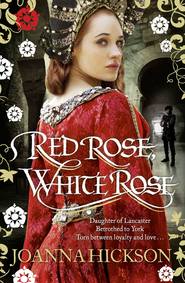По всем вопросам обращайтесь на: info@litportal.ru
(©) 2003-2024.
✖
The Tudor Bride
Автор
Год написания книги
2018
Настройки чтения
Размер шрифта
Высота строк
Поля
Noting the address from which this letter was written, I was thankful that Catherine had not shown it to Joanna Coucy, for we would never have heard the end of it if she had known that the king was staying at her father’s castle. I handed it back, a little surprised that she had shown it to me at all, because of its personal nature. I took it as another example of her fluctuating self-confidence; she wanted me to witness the fact that King Henry still loved her, despite their recent lack of intimacy.
Her mood had changed from listless indifference to brisk intention. ‘Call the steward, Mette,’ she said. ‘I want to hear the arrangements for my lord’s arrival. And bring my sunset gown – the one I wore for my wedding. I will wear it to greet the king today.’
All afternoon, from the window of her chamber, Catherine watched the western sky and it had hardly begun to acquire the first pink tinge of sunset, when a trumpet sounded from the battlements of the keep. She scrambled to her feet, excited and agitated.
‘They have sighted the king’s procession. Quick, Mette! Bring my mantle. I must be waiting for him when he rides in.’
The sunset gown was so called because it was made of dark-blue, filmy gauze embroidered with tiny gold fleurs-de-lys and was worn over a cloth-of-silver kirtle with a wide gold lace hem. When Catherine lifted the skirt to walk, the lace beneath gleamed like the setting sun against a darkening sky. It had been made by my son-in-law, the tailor Jacques, and she had worn it for her wedding to King Henry in the city of Troyes the previous June. It was the first time she had put it on it since that day and it was Catherine’s intention that he should recognise it and understand the significance of her choice.
As the king and his retinue clattered over the causeway and through the fortified gatehouse, Catherine took her place at the top of the sweeping stone stairway that led up to the great hall. Long shadows had formed across the flagging of the inner court and the sky was a fiery orange, causing the approaching horsemen to shield their eyes from its glare. King Henry was in the van and did not wait for a squire to rush forward to take the reins before flinging himself from his horse and taking the steps two at a time to reach Catherine’s side. Heedless of the numerous observers, he first kissed her hand and then drew her to him and kissed her on the lips, clasping his arms hungrily around her as he did so. It was by no means a gentle or decorous salute and, when he eventually pulled back from it, there was a broad smile on his own lips.
‘Catherine my queen, my beautiful bride! I have galloped hard and eagerly to greet you!’
Her cheeks pink with shy pleasure, Catherine sank into a formal obeisance, as all of us around her had already done at the king’s approach. ‘You are well come, your grace,’ she said, tilting her head up to return his smile and expose the long, white column of her throat, where a pulse beat visibly, revealing her own heightened emotions. ‘I too have waited eagerly for you.’
He pulled her quickly to her feet and putting his arm around her shoulders led her through the porch into the great hall. ‘Then let us waste no time, my lady. I have much to show you.’
‘But you must take refreshment, my lord,’ she protested. ‘You have ridden hard.’
The king shook his head. ‘It is no distance from Warwick and they gave me food and drink there. No – let my men rest and eat, I have other plans for you and me. We have not much time before darkness falls.’
Inside the hall the king took me by surprise, addressing me directly. ‘Always nearby, Madame Lanière,’ he remarked with a smile. ‘Has the queen a warm cloak?’ He felt the velvet of the formal mantle Catherine wore and pulled a face. ‘This mantle is not suitable for our purpose. Be sure I recognise the gown however. We will do it justice, I promise you.’
Quite what he meant by that I hesitated to guess, but I bobbed my knee and hurried away to fetch the cloak. ‘And bring one for yourself, Madame,’ the king called after me. ‘A queen cannot do without her handmaid. Meet us at the Water Gate.’
I felt my own heart racing as I hurried to do his bidding wondering, as Catherine must have been, what surprise he had planned for her. I had to seek directions to the Water Gate because, like her, I was as yet unfamiliar with the castle lay-out but I found it quite close to the privy apartments, directly opposite a tunnel leading from the kitchens to a steeply sloping court behind the great hall undercroft. I guessed that supplies for the kitchen were brought by boat across the lake and carried via this route into the cellars. Passing through the gate I found steps leading down to a stone quay and a sailing boat moored alongside. I recognised it as the one we had seen approaching the castle the previous night.
King Henry was already handing Catherine carefully down into the boat. She was shivering and I hastily passed her fur-lined cloak to the king who leaped into the boat, sat down beside her and wrapped her swiftly in its folds. ‘You were just in time, Madame,’ he said, his teeth gleaming in the dying rays of the sun. ‘I think my lady’s blood was about to freeze.’
‘But now I am warm, my lord,’ Catherine murmured softly, ‘and intrigued to know where you are abducting me to at this darkling hour.’
King Henry did not answer her question, but put his arm around her and she snuggled down into his embrace, a smile lighting her face. He pulled the capacious hood of the cloak over her ears and over the gold nets and circlet which held her hair in place. ‘These are regally elegant,’ he said, tugging lightly at the nets, ‘but they will not keep you warm in the lake breezes. Cast off, boatman, and jump aboard, Robin.’ This last was addressed to the young squire who was holding the prow of the boat fast against the quay.
Catherine sat up in alarm. ‘And Mette. Do not forget Mette, my lord!’
The squire grinned and gave me his hand to steady me as I stepped aboard. There was a narrow plank seat set in front of the mast and, unbalanced, I sat down rather heavily, rocking the boat. ‘Your Mette is certainly aboard now, Catherine!’ cried the king with what I considered unnecessary mirth.
The boat nosed out into the lake, pushing the water aside like wrinkled black silk as the red sail filled and flapped in the light breeze, driving us south-east around the castle mound and towards the opposite shore. Little was visible there except the silhouette of an uneven line of trees standing out against the pearly grey sky. Having no fur-lined cloak or lover’s embrace to warm me, I thought a little enviously of the household, sitting down to their hot meal in the great hall and wondered what awaited us in the dark forest ahead. Behind me a murmured conversation was taking place between Catherine and the king, but the words were too indistinct to make out and anyway I assumed they were private. Suddenly I felt terribly lonely, marooned on that black lake with no idea where I was going and glumly certain that I would be the last to be rescued if a sudden storm blew up and threw us all into the water.
I should have had more faith in King Henry’s generalship. There was nothing random about this twilight escapade. Within a few minutes we rounded a low headland and there before us, set against the trees, stood a small castle with crenellated towers, a moat and a drawbridge and torches blazing spluttering greetings from the gatehouse walls.
‘Welcome to the Pleasance,’ said King Henry to Catherine. ‘This is my surprise for my beloved queen.’
Catherine was enchanted. I could hear it in her voice.
‘It is beautiful! It reminds me of the Vallon Vert.’
‘I thought it would,’ the king responded, sounding pleased. ‘Like our pavilion there, the Pleasance is timber, painted to look like stone. I had it built soon after I came to the throne. I wanted a place to retreat to.’ The boat grounded on a gently sloping shingle beach and Robin jumped over the side to keep it steady. ‘Come, there are fires to warm you and a meal has been prepared.’
The king followed his squire over the side and took Catherine in his arms to carry her to the shore. I tutted in disapproval as the train of her bridal gown trailed in the water but she was heedless, as well she might be, snug in the arms of her royal spouse. Clambering down the length of the boat, I was glad to see that it was possible to jump down onto the beach without getting my feet wet, for no one was offering to carry me.
Catherine was right when she said the place reminded her of the Vallon Vert. That had been her name for the little green valley where King Henry had had wooden pavilions built for himself and Catherine and for her parents, the King and Queen of France, to live in during the siege of Melun. It had been high summer and while they were staying in that cool oasis of shade, she and King Henry had discovered that real love might be possible between them.
Those summer pavilions had been little more than wooden tents, but The Pleasance was a more solid construction, designed as a miniature version of Kenilworth with glazed windows and graceful oriels giving views over the lake. King Henry told Catherine that, in the days before his marriage, he had used it to entertain his close friends, hunting in the surrounding forest and feasting in the hall. I assumed that these feasts had not been for men only, but no details were forthcoming. There was certainly plenty of space for amorous adventures. On a quick inspection of the facilities, I discovered several privy chambers in the towers behind the hall but for this romantic interlude, alone with his young queen, the king had ordered a large tester bed set up in the great hall, where the two of them could spend a few days alone together without interruption or distraction.
‘And no siege guns thundering away on the other side of the hill!’ Catherine pointed out to me with joy when the king had gone to check arrangements with the small band of castle servants seconded to The Pleasance. ‘Oh, Mette, is this not perfect? I had no idea that Henry was planning this idyll for us, which makes it so much the better!’
‘And look, Mademoiselle,’ I said, laying my hands on a harp which stood in the shadows beside the carved mantle-hood, beyond the reach of the fire’s heat.
‘A harp!’ she cried, dancing across the room to run her fingers over the strings, filling the air with a rush of liquid notes. ‘It must have been Henry’s mother’s, do you not think?’
‘What must have been my mother’s?’ The king strode back into the room and I hastened to melt into the shadows as he came up behind Catherine. ‘Oh, the harp – yes. She was always making music with some instrument or other. She taught me my first chords when I was three. She loved to sing to us.’ He put his arms around Catherine’s waist and pulled her to him so that her head lay back on his shoulder. ‘Come, let us eat. I am famished!’
‘But I thought you said you ate with the Earl of Warwick,’ Catherine protested.
‘I said I ate at Warwick,’ agreed the king, ‘but the earl was not there and the fare was bread and pottage.’ He shuddered. ‘It filled my belly but offended my senses. Here the cooks have prepared mussels and crayfish, with melted cheese.’ He glanced over his shoulder at me, knowing exactly where I was. ‘Mette can serve us and Robin will play and sing. He is not as accomplished as Owen Tudor, but he will do.’
The squire had followed King Henry into the hall and picked up the harp with a hasty bow before carrying it off. His head soon appeared above the balustrade of a small minstrel’s gallery on top of the screen and a series of notes wafted down to us as he bent to tune the instrument.
King Henry led Catherine towards the fire, where a pile of cushions had been heaped beside the hearth. ‘Where will Owen be now?’ asked Catherine as she sank down onto the soft couch. ‘Have you any idea?’
Owen Tudor was a Welsh archer whom the king had heard playing around a campfire at the siege of Melun and, being impressed with his music, had invited to entertain at the pavilion in the Vallon Vert. All who heard him agreed that he had great skill on the strings and a voice that could vibrate the senses. After the siege ended, King Henry had persuaded Owen’s captain, Sir Walter Hungerford, to allow the archer to join the royal household temporarily, but when the king and Catherine set out for England Sir Walter had requested the archer’s return to his troop, convincing King Henry that it was foolish to waste a good soldier on domestic duties when there were military objectives to accomplish.
‘Hungerford’s troop has joined my brother of Clarence, besieging strongholds on the Loire,’ Henry replied, lowering himself down beside Catherine. He pulled at a cushion so that he could prop himself on his elbow to look at her and she blushed under his intense gaze. ‘Young Edmund Beaufort is there too. Clarence is determined to break the hold of the Pretender in the south.’
I hoped the king would not pursue this subject as it entered territory painful to Catherine’s ears, namely the war between her husband and her brother Charles, whom the English called ‘The Pretender’. It was less than two months since Catherine had discarded into the sea a letter from Charles denouncing her for marrying the enemy and declaring her a traitor to France. It was a painful topic for me as well, because my young son Luc was a huntsman in her brother’s entourage and had been the carrier of the letter. The war which King Henry pursued so relentlessly had opened a raw wound in all French lives, which had not healed since the Battle of Agincourt – England’s glory and France’s catastrophe.
Fortunately he changed the subject to less contentious ground. ‘Kenilworth holds many memories for me. This was where I was healed after I was wounded in the cheek at Shrewsbury. I was brought here with the arrowhead still embedded in the bone of my jaw and a surgeon called Bradmore pulled it out with a special tool he had made.’
I could see that Catherine’s stomach turned over just as mine had at this story. ‘Oh, but my dearest lord, that must have been exquisite agony,’ she cried, her hand reaching out to touch his scarred cheek. ‘How did you stand the pain?’
‘I knew I had to,’ he replied simply. ‘They strapped me down to prevent me moving and I could not cry out because that would have jolted the tool, so I prayed inside my head as loudly as I could. They told me afterwards that I should have died, but God did not permit it. I spent three months here recuperating – the wound was cleansed daily with local honey and my flesh healed in the good air of Kenilworth. Ever since then, I have believed that God intends me to lead England into a great future.’
At this point a small procession of servants emerged from the screen passage at the far end of the hall bearing dishes of various shapes and sizes, followed by a pair of pages with bowls and napkins. The dishes were set down on a buffet and a small table and two chairs were arranged at a suitable distance from the fire, ready for the meal. I hurried to spread a clean linen cloth and cut trenchers from a manchet loaf as the servants departed, leaving the pages kneeling beside the chairs, their bowls ready for hand-washing. I shook my head, took the bowls and napkins and shooed them away, frowning fiercely at the smirks and knowing glances which they cast in the direction of the lovers on the cushions. Rippling harp music began to drift down from the minstrel’s gallery.
All this while Catherine and King Henry had carried on talking in undertones, heads close together. I gave a discreet cough to attract their attention.
Catherine dragged her gaze from the king’s and shot me a glance of mild irritation. ‘I can feel the breeze of your ears flapping, Mette,’ she complained. ‘I hope you will keep a curb on your mouth.’
‘Of course, Madame,’ I responded, hurt at the very suggestion that I might repeat anything I heard from my position of trust and hoping she had only mentioned it in order to satisfy the king’s concern for discretion. ‘Would your graces care to eat while the food is hot?’
‘Indeed we would!’ King Henry rose immediately to his feet and bent to assist Catherine to rise. In the firelight she looked ethereally beautiful in her shimmering night-sky gown, her cheeks rosy with love and warmth. My heart lurched at the sight of her, much as it had eighteen years before when I had pledged my life to the service of the tiny peach-skinned cherub who had been given to me to nurture. If she inspired this emotion in me, what must the king feel when he looked at her?
‘My heart wishes to feast only on the sight of you, fair Kate,’ he said as he bent to kiss her lovingly, ‘but my belly clamours for more solid fare. Luckily, your Mette has the chairs arranged so that I may satisfy both needs at once.’
When they were seated across the corner of the table, Catherine said shyly, ‘Mette knows how I have yearned to be close to you again, my dearest lord. It has been weeks and I have been churlish for the lack of you.’
Precedence ruled that the king be offered the basin first and he gave me a rueful smile as he dipped his fingers in the water. ‘I cannot imagine my beautiful Kate being churlish, Mette. Tell me what she means.’









